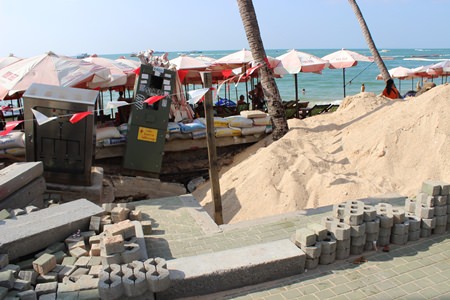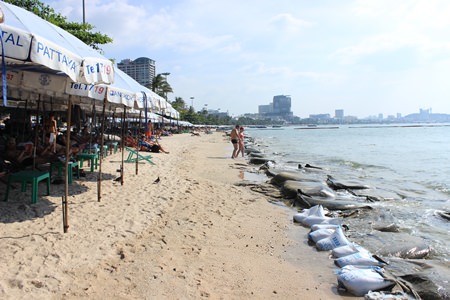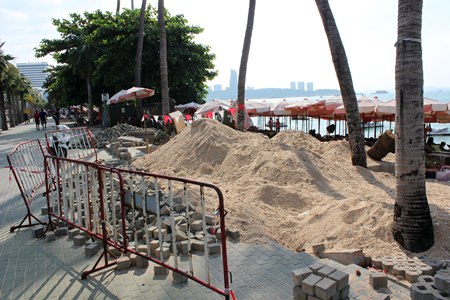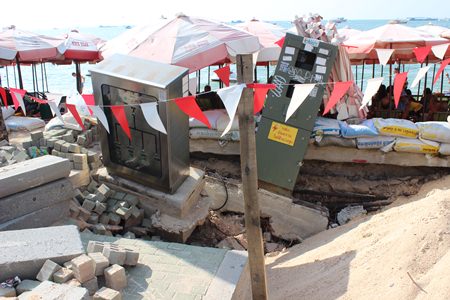The long-delayed rebuilding of Pattaya Beach is expected to begin early next year after the Marine Department approved a 430 million baht budget for the 18-month project.
The city already has spent 13 million baht on planning, and 60 million baht for the first phase of upgrading drainage.
Marine Department Region 6 Director Raewat Potriang said Marine Construction Joint Venture Co. Ltd. was awarded the contract to refill the beach with 360,000 cu. meters of sand from a Rayong estuary. The contract is expected to be signed before the end of the year with work to begin sometime between January and May, depending on the length of the National Council for Peace and Order’s anti-corruption review of the contract.
 The major concern with the beach refill project is the repeated damage to the beach that flood runoff has caused. In areas such as near Soi 6 and Beach Road, water repeatedly has cut large gouges out of the sand.
The major concern with the beach refill project is the repeated damage to the beach that flood runoff has caused. In areas such as near Soi 6 and Beach Road, water repeatedly has cut large gouges out of the sand.
He said 80 percent of the work already has been mapped out and that the entire project should take 18 months to complete.
Sand will be transported from Rayong via barge and kept 1.5 kilometers off shore. Barriers will be built 15 meters off shore to hold sand and two 50-meter-long breakwaters will be built at the end of the beach in North and South Pattaya to block sand from being swept away.
Refill sand also will be stored on land in a 6-8 rai area near the Dusit Thani Hotel.
Marine Department Deputy Director-General Somchai Sumanushajonkul said the Marine Department’s only concern with the project was the repeated damage to the beach that flood runoff has caused. In areas such as near Soi 6 and Beach Road, water repeatedly has cut large gouges out of the sand. The installation of pumps along the beach failed to make any difference.
Earlier this month Pattaya officials announced plans to use 170 million baht of beach-refill project funds to install four new, larger drainage pipelines at four points on Beach Road. The pipelines would be laid in two phases, with a 60 million baht first-phase and 110 million to complete the work.
Plans to rebuild Pattaya Beach began in 2011 when researchers from Chulalongkorn University warned that the beach would disappear within five years if nothing was done to counter erosion.
Yet despite the urgent warnings, funding for the project – originally estimated at 600 million baht – was repeatedly delayed. Pattaya in 2012 performed stop-gap refill projects that managed to keep the beach’s life expectancy at five years.
Thanawat Jarupongsakul of Chulalongkorn’s Geology Department, who has acted as lead consultant on the project since 2011, said that in 1952, Pattaya Beach covered 96,128 sq. meters and was, on average, 35.6 meters wide. By 2011, the beach had shrunk to as little as 3.5 meters.
He warned that the massive beach-refill project would not permanently solve the problem. Erosion has carried away about 10,000 cu. meters of sand a year. If that continues, more would be added in the next decade, he said.







